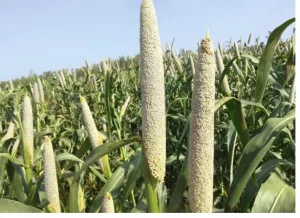Did you know that the United Nations General Assembly (UNGA) declared 2023 the International Year of Millets (IYM 2023)?
Then why are we not talking about super foods like Millets? Why are foreign organizations still pushing Genetically Modified Organisms and GM seeds in Africa? It is time to listen to the farmers in Africa and around the world that have abandoned GM seeds and returned to indigenous seeds. Those are the real experts on the ground! Let’s have discussions on the importance of Millets.
Millets.
The ongoing Africa food insecurity will be solved by going back to traditional staple foods such as millets. Millets are a powerhouse of minerals, nutrients and antioxidants. They contain more protein, calcium, iron and phosphorus than rice or wheat. They are gluten-free, lower in fat, have a low glycemic index and are a very rich source of fiber.
World renowned scholar and food sovereignty advocate Dr. Vandana Shiva has very well explained the importance of staple crops like millets in fixing food scarcity, environmental and climate issues. Millets are some of the best protectors of the environment. They thrive in harsh climatic conditions and do not require any synthetic fertilizers or pesticides to grow. They require very little water compared to maize, wheat or rice and they grow in various soil conditions. Their extensive root systems help improve soil fertility by fixing nitrogen in the soils. One of our other articles highlights the importance of these super foods. On the contrary, GMOs destroy biomass and biodiversity, they pollute the environment and worsen climate change. In addition to toxic pesticides, herbicides and synthetic fertilizers, GMOs are going to leave Africans poorer, sicker, hungrier and less fertile.

Genetically Modified Organisms will make Africa:-
Poorer.
The greatest lesson learned about the economic disadvantages of GMOs was from international seed companies’ efforts to monopolize and control seeds around the world. The ability for companies such as Monsanto/ Bayer to patent seeds means that all farmers will have to rely on them entirely. African farmers should be free to conserve, save and share their seeds, without being coerced to purchase seeds, pesticides and synthetic fertilizers from these companies. Farmers that can save and share their own seeds have an economic and competitive advantage without having the pressure to always buy seeds they don’t like. Climate change have drastic effects on crop yields and in times of poor production, farmers suffer great losses and this contributes to poverty, economic distress and in many cases suicides like in India, where suicides among farmers are up 30% since 2019. In India, yields from the implementation of hybrid Bt Cotton have stagnated, yet production costs have increased. That same complaint was raised by Bt Cotton farmers in Kenya, who have now resulted to go back to indigenous seeds. Also, the lack of a ready market means that farmers do not gain profit from their yield, instead they face heavy financial losses from having to repay the debts they acquired during acquiring seeds, fertilizers and pesticides. This leads to frustration and the vicious cycle of poverty.
Hungrier.
It is time to have real dialogue on the causes of hunger in Africa. It has less to do with food shortage, more of food inequity and wastage. Without addressing all these factors, GMOs will not solve Africa’s hunger crisis. Corruption and greed in Africa creates the inequity that contributes to Hunger. Poor infrastructure and unequal distribution of food are key drivers of hunger in Africa. Insecurity and armed conflict in arid marginalized regions contribute to hunger and inability to access food, as well as natural disasters, political, environmental or socio-economic aspects. It is absurd that some politicians would rather import food duty free to ‘feed the starving population’ while other parts of the same country have bountiful harvests with farmers decrying the lack of ‘markets’ for their produce. This kind of policies, and cartels that hoard and manipulate food prices create artificial ‘food insecurity’. With GMOs, the cartels will get even larger as middlemen try to hike seed prices and buy produce cheaply. National Geographic states that ‘merely increasing crop production will not solve inequity in access to food’.
Sicker
No matter how many scientists are paid off to claim that GMOs are safe, they are not. A lot of research has been funded by organizations or philanthrocapitalists that have competing interests in GMOs, and are out to ensure their economic wellbeing. Independent studies have shown that GM foods have negative impacts on our health, and Jeffrey Smith’s book ‘Seeds of Deception’ has exposed the industry and governments’ lies. Health risks from GMO foods include cancer. Studies show that animals ‘fed with Monsanto/Bayer’s glyphosate-resistant GE corn developed large cancerous tumors’. Coincidentally, cancer cases have been increasing in Africa and the farming and consumption of GMOs is among one of the many factors contributing to high cancer rates. GM foods cause increased allergies, they destroy the micro biomes in the gut, contribute to obesity and weight gain among other health risks. One other article we wrote on this explains why GMO are harmful.
